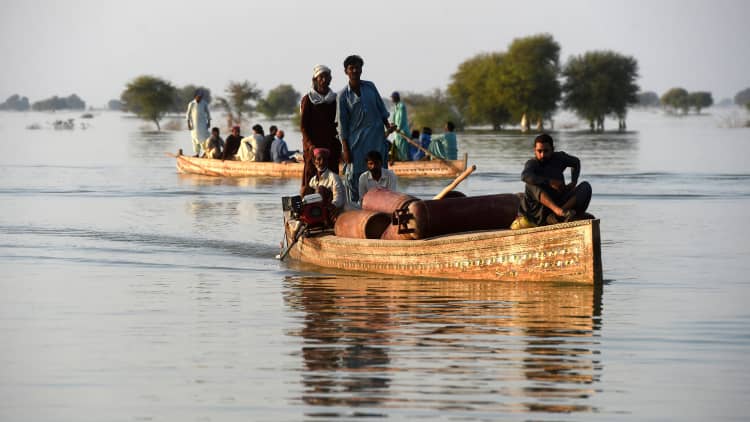Historic deal for poorer nations as COP climate summit agrees to 'loss and damage' fund
Delegates at the world's biggest climate-related conference struggled to build consensus on an array of issues.

Climate reparations, or "loss and damage" funding, is a highly divisive and emotive issue that is seen as a fundamental question of climate justice.
Sean Gallup | Getty Images News | Getty Images
Government ministers and negotiators from nearly 200 countries finally secured an agreement Sunday to create a new fund to compensate poor nations for the "loss and damage" they're experiencing as a result of extreme weather worsened by climate change.
The agreement, reached in the early hours of Sunday morning, also reaffirmed efforts to limit global temperature rise to the crucial temperature threshold of 1.5 degrees Celsius above pre-industrial levels.
The two-week-long COP27 climate summit took place in Egypt's Red Sea resort town of Sharm el-Sheikh against a backdrop of increasing extreme weather events, geopolitical conflicts and a deepening energy crisis.
Delegates struggled to build consensus on an array of issues, even as a flurry of U.N. reports published ahead of the conference made clear just how close the planet is to irreversible climate breakdown.
The scale of division between climate envoys saw talks run beyond Friday's deadline, with campaigners accusing the U.S. of playing a "deeply obstructive" role by blocking the demands of developing countries.
Some of the major sticking points included battles over whether all fossil fuels or just coal should be named in the decision text and whether to set up the "loss and damage" fund for countries hit by climate-fueled disasters.
The highly divisive and emotive issue of loss and damage dominated the U.N.-brokered talks and many felt the success of the conference hinged on getting wealthy countries to agree to establish a new fund.
The summit made history as the first to see the topic of loss and damage funding formally make it onto the COP27 agenda. The issue was first raised by climate-vulnerable countries 30 years ago.
Lifting hopes of a breakthrough on loss and damage thereafter, the European Union said late Thursday that it would be prepared to back the demand of the G-77 group of 134 developing nations to create a new reparations fund.
The proposal was welcomed by some countries in the Global South, although campaigners decried the offer as a "poison pill" given the bloc said it was only willing to provide aid to "the most vulnerable countries."
Rich countries have long opposed the creation of a fund to address loss and damage and many policymakers fear that accepting liability could trigger a wave of lawsuits by countries on the frontlines of the climate emergency.
The final agreement was reached after tense negotiations throughout the night, with many delegates exhausted by the time the deal was announced around 4 a.m. local time.
There has been some disappointment that there was a lack of emphasis on raising targets to curb emissions, and there are many details around the loss and damage fund that are yet to be ironed out, including the thorny issue of which countries will pay into the fund.
"I am pleased that COP27 has opened a new chapter on financing loss and damage, and laid the foundations for a new method for solidarity between those in need and those in a position to help," European Commission President Ursula von der Leyen said in a statement.
"COP27 has kept alive the goal of 1.5C. Unfortunately however, it has not delivered on a commitment by the world's major emitters to phase down fossil fuels, nor new commitments on climate mitigation," she added.


 Hollif
Hollif 






























